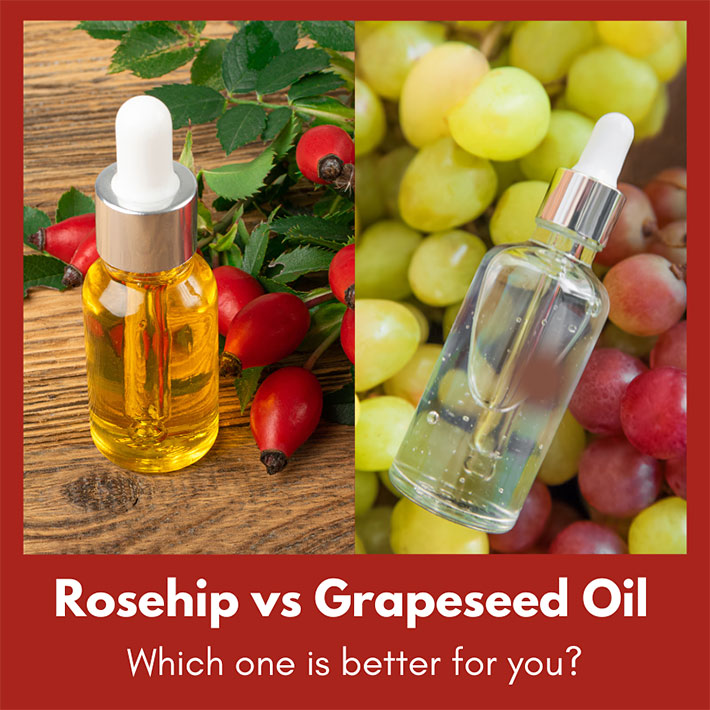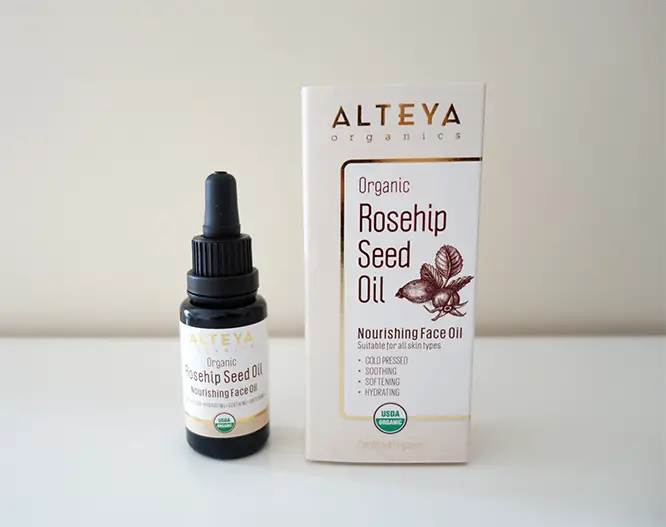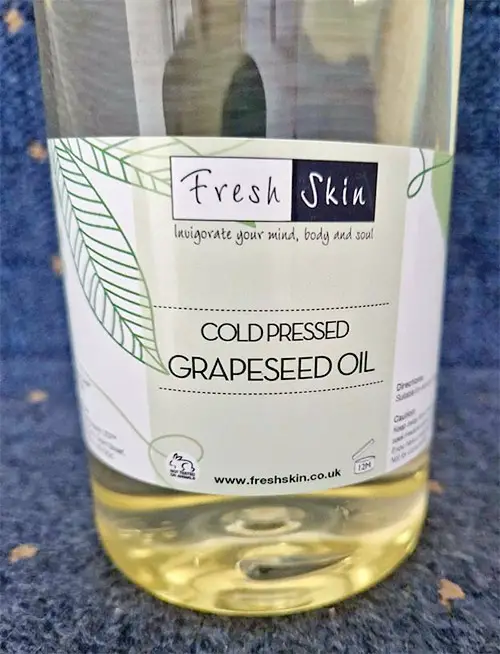
Rosehip seed oil and grapeseed oil are both widely praised for their effectiveness in tackling skin issues like acne. While both are excellent for nourishing the skin, they have distinct qualities that set them apart. In this article, we compare rosehip seed oil vs grapeseed oil to help you determine which is better suited for your skin type.
Table of Contents
- Understanding the Differences: Rosehip Oil vs. Grapeseed Oil
- Breaking Down the Benefits for Your Face: Rosehip Oil vs. Grapeseed Oil
- Which is Better for Oily Skin?
- Which is Better for Acne?
- Can You Mix Grapeseed Oil with Rosehip Oil?
- Conclusion: Which is Better Rosehip Oil or Grapeseed Oil?
Understanding the Differences: Rosehip Oil vs. Grapeseed Oil
What Makes Rosehip Oil Unique?
Rosehip oil comes from the seeds of the dog rose plant and has a light reddish-orange color with an earthy scent. It’s known for its skin brightening and anti-acne benefits, largely thanks to its high vitamin A content.
What’s Special about Grapeseed Oil?
Grapeseed oil is derived from the seeds of grapes, often as a by-product of winemaking. This oil is light yellow and has a nutty, slightly sweet aroma. It stands out for its rich antioxidant properties, primarily due to its high levels of polyphenols.
Comparing Their Chemical Compositions
The key to understanding these oils lies in their chemical makeup and how they interact with your skin. Here’s a breakdown:
- Fatty Acid Profiles:
- Rosehip Oil: Comprises up to 58% linoleic acid, 26% alpha-linolenic acid, and 22% oleic acid.
- Grapeseed Oil: Dominantly contains about 75% linoleic acid and 14% oleic acid.
- Antioxidant Content:
- Grapeseed Oil: It’s a powerhouse of antioxidants like tocopherol (vitamin E), flavonoids, carotenoids, phenolic acids, tannins, and stilbenes, including catechins, epicatechins, trans-resveratrol, and procyanidin B1.
- Rosehip Oil: Rich in carotenoids such as beta-carotene and lycopene, as well as beta-cryptoxanthin, rubixanthin, zeaxanthin, and lutein. It also contains phenolic compounds including flavonoids and proanthocyanidins.
Each oil brings its own set of benefits, with rosehip oil being a champion for skin brightening and acne treatment, and grapeseed oil excelling in antioxidant protection.
Breaking Down the Benefits for Your Face: Rosehip Oil vs. Grapeseed Oil
Understanding the unique benefits of rosehip and grapeseed oil for facial care can help you make an informed decision based on your skin’s needs. Here’s a breakdown of what each oil offers:
Benefits of Rosehip Oil for the Face:
- Balances Sebum Production: Ideal for oily and acne-prone skin due to its high linoleic acid content, which balances sebum production and reinforces the skin’s barrier.
- Prevents Acne: Contains Vitamin A, which helps renew and exfoliate skin, preventing acne and keeping your complexion bright.
- Treats Hyperpigmentation: Combines Vitamin A and C, plus proanthocyanidins, to reduce hyperpigmentation and acne scars by inhibiting melanin production.
- Moisturizes Skin: Its balanced fatty acid profile provides excellent hydration, making it a lightweight, non-comedogenic moisturizer.
- Anti-Inflammatory Properties: Rich in Vitamin E, it soothes skin irritations, beneficial for inflammatory acne types.
- Anti-Aging Benefits: Packed with antioxidants, it combats oxidative stress, slowing down the skin’s aging process.

Benefits of Grapeseed Oil for the Face:
- Promotes Healthy Skin: Enriched with antioxidants, beta-carotene, and linoleic acid, it maintains and strengthens skin health, regenerating damaged cells.
- Fights Acne: Contains antibacterial compounds like gallic acid, reducing inflammation, redness, and hyperpigmentation.
- Anti-Aging Effect: High antioxidant content protects against premature and photoaging, enhances collagen and elastin, and evens skin tone.
- Strengthens Skin Barrier: Predominantly composed of linoleic acid, it repairs and fortifies the skin’s barrier, especially beneficial for dry or dehydrated skin.

Both rosehip and grapeseed oil offer distinct benefits for facial skincare. Your choice will depend on your specific skin concerns, whether it’s managing acne, combating aging, or improving skin health and hydration.
Which is Better for Oily Skin?
If you have oily skin, you can use either of these oils on your skin. However, rosehip oil does a better job at controlling sebum production, as it contains both linoleic and alpha-linolenic acids. It also has exfoliating properties that can help with unclogging pores in oily skin. On the other hand, grapeseed oil is best for dry skin but can be used by all skin types.
Which is Better for Acne?
Although both oils have anti-inflammatory, antioxidant, and skin healing properties, rosehip oil is the best option for treating acne. This is because of its high concentration of vitamin A. Vitamin A is one of the most used ingredients for treating acne as it not only treats but equally prevents breakouts. Added to this, rosehip oil is effective against acne scars, textured skin, and hyperpigmentation.
Can You Mix Grapeseed Oil with Rosehip Oil?
Mixing grapeseed oil with rosehip oil is not only safe (except in cases of allergies) but also can be highly beneficial for your skin. This combination brings together the best of both oils, making it a potent blend for your skincare routine.
When you mix these oils, you get a balanced concoction that harnesses grapeseed oil’s antioxidant-rich properties and rosehip oil’s vitamins and essential fatty acids. This synergy can enhance skin health, providing hydration, nourishment, and protection.
How to Use the Combination:
- As a Night Serum: This blend is particularly effective as a part of your nighttime skincare routine. Apply a few drops of the mixed oils to your face after cleansing and before your night cream. The overnight period allows the oils to deeply penetrate and work on repairing and rejuvenating your skin.
- Customize the Ratio: Depending on your skin’s needs, you can adjust the ratio of the oils. If your skin is more on the oily side, you might prefer a higher proportion of grapeseed oil for its lighter texture. Conversely, if your skin is dry, increasing the amount of rosehip oil can provide more hydration.
- For Body Use: This oil blend can also be applied to other parts of the body that might need extra care, like dry elbows, knees, or even as a post-shower body oil for overall skin nourishment.
- Patch Test: Always remember to do a patch test before using any new combination of skincare products, especially if you have sensitive skin or are prone to allergies.
Conclusion: Which is Better Rosehip Oil or Grapeseed Oil?
Grapeseed and rosehip oil are very moisturizing and nourishing oils with amazing benefits. For those with oily and acne-prone skin, rosehip oil is the best option to cater to your skin type while grapeseed oil works best for dry and acne-prone or eczema-prone skin. However, both oils can be used together especially to target acne and hyperpigmentation.

Petra Nakashian (previously Kravos) is a dedicated natural health and beauty blogger, driven by the loss of her parents to cancer, which led her to meticulously research beauty product ingredients. With over 10 years of experience, her in-depth knowledge has made her a trusted expert in the field. Founder of Be Healthy Now and Green Beauty Talk, Petra recently expanded her expertise with Beauty Insights Hub, exploring a wider range of beauty treatments. Committed to transparency and honesty, her work is a vital resource for navigating the complex world of beauty.

